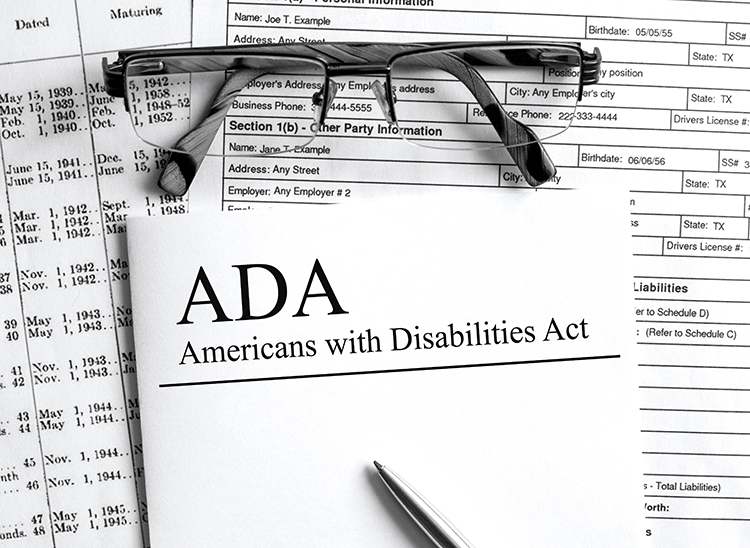Accommodation Awareness: As management retools remote work policies, ADA issues are expected

“During the pandemic, we’ve seen that many office jobs can be done remotely and that working remotely can be an effective accommodation for individuals with mental health issues,” says Amy Epstein Gluck, a founding partner in the Washington, D.C., office of Pierson Ferdinand. (Image from Shutterstock)
For some employers, including law firms, it’s long past time to get employees back into the office. But some workers, from staff to lawyers, are putting up a fight, pushing for hybrid or fully remote work schedules.
Employees with disabilities are at the forefront of this battle, arguing that remote work can be a reasonable accommodation under the Americans With Disabilities Act. Businesses requiring employees to return to the office should expect requests for remote work accommodations based on a variety of disabilities, including mental health conditions, employment law and disability rights, experts say.
According to the U.S. Equal Opportunity Commission, remote work, which it describes as telework, can be a reasonable accommodation for individuals with disabilities so long as the employee can perform essential job functions. In addition, the remote work must not cause the employer undue hardship. Undue hardship includes significant difficulty or expense, says Brandalyn Bickner, an EEOC spokesperson. “The ADA does not permit an employer to refuse to provide telework as a reasonable accommodation solely because it generally prohibits employees from working remotely, either part time or full time,” she explained.
Employee requests start the ADA accommodation process. Employers can ask for a health provider diagnosis stating that the employee’s disability substantially limits them in a major life function and that the appropriate accommodation is remote work. After that, the employer and the employee are expected to engage in what the EEOC describes as an “interactive process,” in which they discuss and even find compromise on how best the employee can fulfil the essential functions of the job.
Susan Rider, a partner with Scharf Banks Marmor, specializes in employment counseling and litigation. Employers promoting a back-to-office mandate are going to have to “ask themselves what is truly essential about coming back to the office,” says Rider, who is based in Chicago. “Is it just that they prefer to have them there? That’s not going to be sufficient when it comes to the ADA.”
Employees with disabilities often maintained or even enhanced their work opportunities during the pandemic, according to Robert Dinerstein, professor of law emeritus at American University Washington College of Law and chair of the ABA Commission on Disability Rights. “With employers forcing employees back into the office, these workers are saying, ‘Wait a minute. It worked great for us remotely. We were able to do a good job,’” he says.
Rider warns that employers need to take seriously all disability claims and not treat visible disabilities differently than invisible or less outwardly obvious disabilities, such as mental health conditions.
“Many employers have a level of distrust when it comes to mental health diagnoses,” she says. “Employers can tend to put a higher burden of proof on employees in need of mental health accommodations.”
Adding to the issue is an increased awareness and concern over mental health. One third of adults in the U.S. say they have a diagnosed mental health condition, a 5-percentage increase from pre-pandemic levels, according to a 2023 survey conducted by the Harris Poll on behalf of the American Psychological Association. The conditions most cited were anxiety at 24% and depression at 23%.
“During the pandemic, we’ve seen that many office jobs can be done remotely and that working remotely can be an effective accommodation for individuals with mental health issues,” says Amy Epstein Gluck, a founding partner in the Washington, D.C., office of Pierson Ferdinand. She represents employers, and her firm is fully remote.
“Employers are going to have to really educate everyone in their offices, including their managers, about mental health issues in the workplace, how to recognize requests for accommodations when it’s not obvious, that people with mental health issues need to be accommodated and that remote work may be part of that,” Epstein Gluck says.
In 2021, the EEOC received about 8,400 charges alleging employment discrimination due to a mental health condition or substance use disorder, according to the agency’s website. Last September, it sued a Georgia employer for refusing to allow a web designer with disabilities to work remotely and firing her soon after she requested the accommodation. The U.S. District Court for the Middle District of Georgia case, EEOC v. Zoe Center for Pediatric and Adolescent Health, is ongoing.
 Roberta “Bobbi” Liebenberg, a senior partner at Fine, Kaplan and Black, a Philadelphia law firm, co-authored the ABA’s 2022 Practice Forward Report, Where Does the Legal Profession Go From Here?
Roberta “Bobbi” Liebenberg, a senior partner at Fine, Kaplan and Black, a Philadelphia law firm, co-authored the ABA’s 2022 Practice Forward Report, Where Does the Legal Profession Go From Here?Employer quandary
It seems that many employees, regardless of whether they have a disability, want to continue with work-from-home arrangements, but employers often have different views. According to a survey by ResumeBuilder.com, eight in 10 companies will track employee office attendance in 2024. Companies believe bringing employees into offices increase productivity, improves workplace culture and results in improved employee satisfaction, according to the survey. Also, it found that 29% of business leaders thought returning to the office would reduce employee burnout.
An issue for employers centers on workers who prefer a more flexible schedule and are willing to leave over it.
Roberta “Bobbi” Liebenberg, a senior partner at Fine, Kaplan and Black, a Philadelphia law firm, co-authored the ABA’s 2022 Practice Forward Report, Where Does the Legal Profession Go From Here? The report, which surveyed almost 2,000 ABA members, found that 44% of lawyers who have practiced 10 years or less would leave their employment for one with a greater ability to work remotely.
“The research demonstrates that lawyers, and particularly female lawyers and lawyers of color, are more willing to leave places of employment that don’t allow for working a hybrid schedule or completely remotely,” Liebenberg says.



